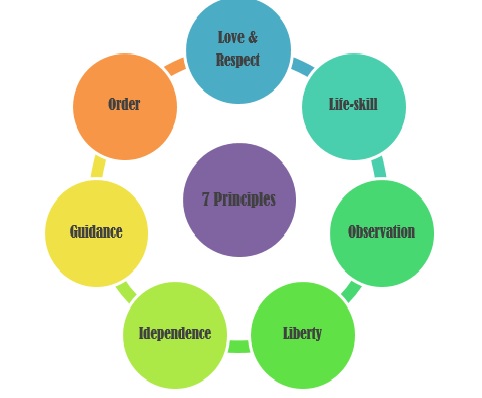The unprecedented time is pushing us to take transformative measures. The time spent at home can be used as an opportunity to redefine our life and adapt to newness. While teachers are curving out their tools to support students with remote learning, parents can too juggle between work and take care of children peacefully.
Young learners’ adaptability is much quicker than adults. Parents, who are finding it difficult to navigate everyday life, must try Montessori parenting. The growing demands of Montessori education definitely something to talk about.
Maria Montessori was a visionary, her views of education bring a holistic approach. Children teach themselves encapsulates her lifelong pursuit for reforming education. Montessori philosophy is based on developing children to prepare themselves for life, where they can grow independently with a deep-rooted love for learning.
Inspiring Principles of Montessori Education ---
Independence – Maria Montessori believed learning is a self-directed process. It comes naturally to children. To encourage independent learning parents can support their children with a prepared environment.
Liberty – Children like to choose on their own. The freedom of choice enables them to engage in meaningful learning. Education cannot be imposed on anyone. A child’s interest and their freedom to choose which activity they want to indulge, elevate the learning experience.
Love & respect – Love and respect is the keynote that holds the heart and the mind together. The unique nature of a child is the most special trait within and it needs to be nurtured. Respecting individuality motivates the learner to be high spirited.

Guidance – The sense of guidance holds an intrinsic value in Montessori education. Alongside the freedom of choice, Maria Montessori also believed children need direction in the learning environment to practice freedom within limits.
Life skill – Montessori Method comprises of different areas of knowledge – interpersonal, intrapersonal, musical, spatial, kinesthetic, intuitive linguistics, and logical. when children are given the opportunity to expand their skills in such activities, adaptability to life skills increases.
Observation –Observation broadens the scope to notice the interest of each child. It allows the adult to provide them with the learning activities that are in alignment with individual choice.
Order – Children thrive more when their surrounding environment is stable, predictable, and structured. A well-prepared setting helps them become harmonious with the learning process.
How to Ingrain Montessori Method to Support Learning at Home?
Montessori parenting is a classic approach to educate children. Now that parents have to manage it all from home – professional life and caregiving, this dual role can be quickly adapted with the Montessori approach. Walking in alignment with Montessori principles, preparation, consistency, and flexibility can make learning at home accessible.
Practical ways to create a learning environment at home –
Prepare The Environment
First thing first, your home environment should be organized. Implementing routines can be the first thing to bring order at home. Plan the day ahead with the appropriate sequence. From the wake-up time to virtual class to playtime all of the daily chores must be rhythmic. You can readjust the time whenever needed; however, creating a routine and following them makes it easier to keep an orderly environment.
Help Them Take Responsibility
Although the home environment may not have enough resources to choose from abundant options, nonetheless, your goal must be to provide them with learning opportunities as much as possible. If your children are already accessing virtual Montessori lessons with their teacher, your role is to support them take responsibility for themselves and their belonging.
Encourage Self-care & Home Activities
Supporting children does not mean doing everything for themselves. Organic learning happens when we are able to prepare children for life. Being parents, often time we overdo for our children. Keep in mind our goal in supporting children must involve a healthy approach to self-sufficiency. Ask them to take care of their own body. Involve them with home activities such as laundry, kitchen work, gardening, etc. All these learning are equally essential.
Conclusion
Children learning experience can be supported with a collaborative effort of both teachers and parents. It is important to remember change can seem difficult in the beginning, but with patience and persistence, the quality of life can be maintained. Children look up to their parents as their primary role models. Keeping the home environment with a positive tone is integral. Taking care of the smallest things can make a larger impact on all our lives.
Written By : Soma















